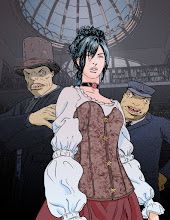In the late 1970s, comics in France were undergoing a process of maturity that increasingly appealed to an adult audience. On one hand, there was a generation that grew up reading the weekly magazines Spirou and Pilote and still wanted to read comics as adults. On the other hand, the cultural revolution of May 1968 had caused serialized stories for children and teenagers to adopt increasingly complex and sometimes profound themes. These themes began to appear directly in album format with more daring proposals, and monthly comic magazines emerged alongside juvenile weeklies.
Jean Claude Forest had made a lot of noise in the previous decade with Barbarella, a comic that, in hindsight, may seem tame and simplistic, but at the time, it was a revolutionary milestone for its treatment of sexual themes, which today may seem too innocent and even sexist rather than feminist. The editors of the emerging magazine A Suivre proposed to Forest that he write, not draw, a truly adult story, whether it included sex or not. Without imposing thematic or length limitations on the writer, as the logic of the new magazine was to give authors freedom, the chosen artist to join this editorial adventure was Jacques Tardi. So, in the first issue of A Suivre in February, the first chapter of Ici Meme (You are here) would appear, a beautiful story that would extend over 163 pages published in the first twelve issues of that magazine.
Through a complex series of legal maneuvers and inheritance disputes, Arthur Meme has been stripped of his family estate, retaining only the walls that divide the different parcels of Mornemont. His pathetic revenge consists of being the gatekeeper for the invaders and charging them exorbitant tolls for crossing each parcel. Meme's life revolves around running on the walls of Mornemont, opening and closing gates whenever someone enters or exits, regularly paying lawyers who are trying to reclaim his land (although the judges seem to be bribed by the usurpers), endless arguments with the shopkeeper who regularly approaches Mornemont by crossing a small lake that separates the region from the rest of France, and mysterious phone calls that Meme makes to a presumed mother who may not be listening to him very much. The monotony of this grotesque situation is interrupted when Meme falls in love with the young Julie, a graceful teenager with a great disposition for breaking hearts, the daughter of one of the prominent families of Mornemont. While she feels drawn to the strange Arthur Meme, she is not willing to fully reciprocate his feelings. However, it's not just Meme who is captivated by Julie; even the President of the Republic, facing a highly compromised re-election in the polls, longs to live in this sort of independent republic of Mornemont. In Ici Meme, no love will be reciprocated, some will succumb to the misfortune of impossible desires, political intrigues and legal disputes will have unforeseen outcomes, and Arthur Meme will ultimately seriously question the miserable sense of his materialistic obsessions.
Ici Meme is a comic that could only have been created in that glorious era of European adult comic magazines when these magazines were purchased at kiosks, and readers patiently waited an entire month to find out what happened next. The story is a product of the movement that sought to give French comics a literary quality without becoming too serious or frivolous. It's, by far, the most ambitious story Jean Claude Forest ever wrote and marked the beginning of a brilliant career for Jacques Tardi. Looking back, Ici Meme has many virtues. First and foremost, it doesn't take itself too seriously. The story is exceptionally well-told, the drawings by the young Tardi are wonderful, and its satirical tone brings it closer to a seemingly very different work from the same era, Will Eisner's marvelous Life in Another Planet. Additionally, its theatrical tone and satirical atmosphere do not diminish its poetic aura or its ability to evoke emotions through beautifully rendered surreal imagery. It's undeniably a pillar of the graphic novel genre that has aged with great elegance.
Read it, if you can.














No comments:
Post a Comment